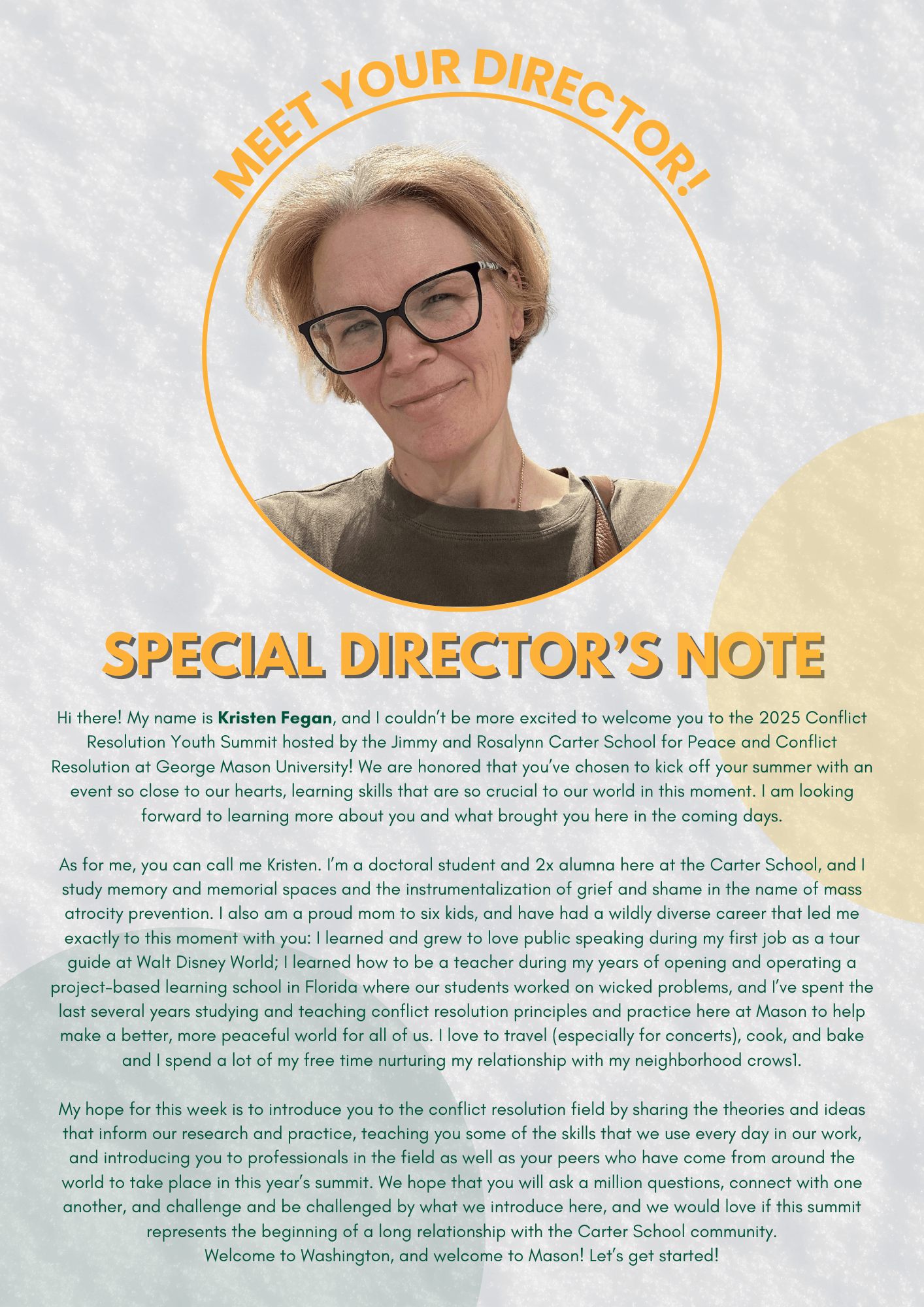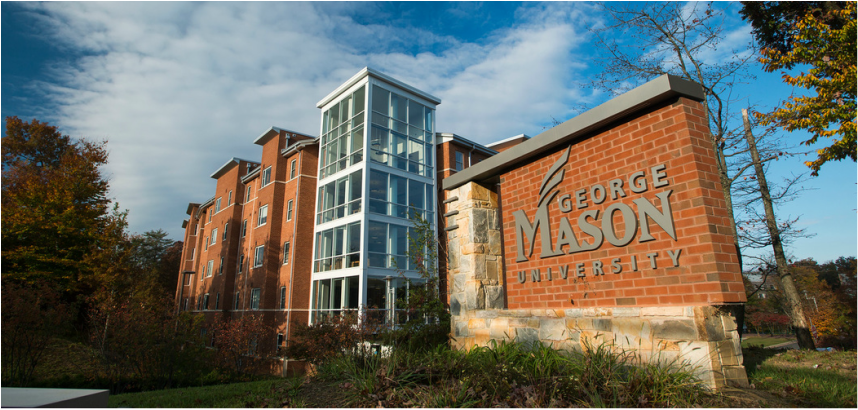Contact Info
Email: Averi Jordan at ajorda22@gmu.edu
Ready to tackle today’s toughest challenges? Join us at George Mason University for a four-day, overnight Youth Summit where high school students from across the country come together to collaborate, problem-solve, and spark real impact. Together, you’ll connect over shared interests, engage in meaningful dialogue, and gain fresh perspectives on the issues shaping our world.

Delve into important conflicts, learn new skills, practice the processes of promoting peace and engaging with tough issues to make a positive difference. Join us for an exciting cohort experience with your peers. Earn a college credit while engaging in simulations, workshops, and facilitated discussions. Explore issues related to:
- Global Conflicts
- Social Justice
- Conflicts within Relationships
- Peacebuilding
- Collaborative Leadership
Through the experience you will gain skills in leadership, cross-cultural understanding, and community engaged dialogue as well as build relationships and make new connections while exploring possible opportunities to work in the area of peace and conflict resolution.
Offered by the Carter School for Peace and Conflict Resolution at George Mason University, a preeminent leader in innovative teaching, cutting-edge research and engaged practice.
Dates:
June 21st-24th, 2026
Cost:
$890 - CRYS is a four day (and three nights) summit that includes on campus lodging, programming, and all meals.
Add 1 college credit for just $100 dollars more ($990.00)!
Qualifications
- Rising high school 10th, 11th, and 12th grade students
- Interest in leadership, peacebuilding, community engagement, social sciences, or just want to learn more about conflict resolution!
How to Apply
- Applications open in January, and students can use the application below. Once admitted, students will receive further instructions on how to register and submit their deposit. The due date to apply is April 15th.
- For students interested in being reviewed for a scholarship need to indicate so on their application. To be reviewed, students must submit a personal statement and their parents' most recent 1040 federal income tax form.
Questions?
- Visit our FAQ's at the bottom of this page!
Hear from our Community:
Alumni
When I first found out about Peace & Conflicts I immediately resonated with it. For me it has been a little difficult finding a major that feels like “Lela”, this was the first one that actually excited me. I could easily envision myself doing this type of work and thriving in it. Thank all of you for creating such a warm and inviting space for everyone. It is rare to see such a genuinely kind community. Thank you again for allowing me to have this experience! -Lela, 2024 Participant
The highlight of the program was the lectures. I loved listening to what the lecturers had to say, and I learned valuable information from them. They all brought awareness not only to issues I did not know of, but also helped me create a better understanding of issues I thought I had understood. I just wish I had more time to listen to them! -Yuri, 2023 Participant
Parents
The Conflict Resolution Youth Summit was an amazing opportunity for our daughter. She met peers and adults from varied backgrounds but with similar values and interests. She learned skills that she will use throughout her life in both intrapersonal and professional settings. As parents who sent their teenage daughter halfway across the country, we were very pleased with the level of care and security provided by conference leadership at all levels. The emphasis on providing an intentional cross-cultural experience was also invaluable--from the diversity of attendees and staff to the on- and off-site activities and meals-- this added unexpected value for us. -Parent of a CRYS 2025 attendee
Meet our Staff
Meet our 2026 Staff


Meet Last Year's Staff!





George Mason University
George Mason University is Virginia’s largest public research university. Located near Washington, D.C., Mason enrolls 35,000 students from 130 countries and all 50 states. Mason has grown rapidly over the past half-century and is recognized for its innovation and entrepreneurship, remarkable diversity and commitment to accessibility.
Get Your Questions Answered:
Student Frequently Asked Questions:
Can I choose my roommate?
No – A benefit of the Youth Summit is that students get to meet new people, build new relationships, and gain new perspectives.
Can someone bring me Starbucks during the program?
No – The Youth Summit is an immersive experience where everyone equally gets to experience what it’s like to be a college student at GMU. If you forgot to pack something important, have your parents reach out to CRYS leadership and request a drop-off that does not impact the CRYS programming.
What should I pack?
- Your color group colors! (We will provide you with a CRYS T-shirt for the DC day)
- Dress code: We follow the typical school-appropriate dress code, so comfortable but not immodest. We want everyone to feel comfortable while also maintaining a respectful and professional environment that reflects the spirit of the Summit!
- One business casual outfit for the closing ceremony
- Light jacket or sweatshirt
- Good walking shoes
- Toiletries (toothbrush, hairbrush, deodorant, etc…)
- Don’t forget shampoo, conditioner, soap, etc!
- Unless you purchased it with your deposit, you need to bring your bath towel, washcloth, bedding, pillow, and sheets!
- Phone charger
- You are welcome to bring snacks, but we will be providing snacks for you as well. Students are not allowed to use the vending machines on campus!
- Rain jacket or umbrella
Can my parents come to the closing ceremony?
Absolutely! We encourage all parents to come support their students as they receive their certificate of completion during our closing ceremony. Students who are admitted with receive a link where parents can register and gain more details.
Is this a good program to put on a college application?
Yes, this program is a great opportunity to highlight academic and co-curricular experience.
Do I have to be interested in the field of Conflict Analysis and Resolution to attend this summit?
No, we believe that the skills and experience that you will gain from this summit are versatile and transferable to anything you put your mind to.
Safety and Security
- The safety of our students is our staff and faculty’s highest priority. Parents and guardians can call a member of our leadership team at any point during the Summit. Students are supervised during all activities at the Summit, both on and off campus. While students will have some opportunities for independent time, all students will remain in small groups with adult staff at designated locations.
GMU Housing
- All CRYS attendees must reside in Mason’s secure resident halls that are monitored at all times by adult faculty members. Specifically, we have two floors (one male and one female). Rooms are suite style with two rooms connected by a shared bathroom. Two students will be assigned per room so everyone will have a roommate. Students are not allowed to enter a suite that is not their own. Staff living on the floor will conduct security room checks each night. Resident halls have security cameras, 24-hour desk staff, and individual key card entry access required for building entry, floor entry, and room entry. All CRYS staff reside on the same floors as students, and all undergo a background check as required by George Mason University.
Student Acommodations
- Prior to attending the Summit, all students are required to submit a detailed medical, dietary and emergency contact survey to help staff ensure they have a safe experience on campus. Staff work closely with families to identify medical, dietary, and learning needs and meet students where they are to ensure a successful learning experience.
Getting to CRYS
- Daily transportation to and from the program are not provided.
- Students from across the country come to the Youth Summit, and many choose to fly into DCA or IAD airport. Students may taxi or Lyft to campus if they do not have a family member or friend in the area to assist. All travel plans are communicated with CRYS leadership in advance.
Commuting Options
- To ensure a fully immersive experience that fosters community building among participants, all students attending the Conflict Resolution Youth Summit are required to stay in the designated dormitories for the duration of the program. Per our overnight policy, we do grant exceptions but the student/parent must submit a formal request detailing their reasoning along with any supporting documentation (ex: doctor's note for medical exemptions), and all requests are reviewed on a case-by-case basis. If the exception is granted, this does not discount the price of attending. This policy is in place to enhance the overall experience of the youth Summit while ensuring the safety and well-being of all participants
Receiving Course Credit
- CRYS students will receive one general elective college credit for attending and participating in the Washington Youth Summit on the Environment. The credit is earned on a pass/fail basis from George Mason University and is transferable as determined by the college/university students attend. Credit information is provided to students upon completion of the program and once the student’s transcript is processed by George Mason University’s Registrar.
- Credit Requirements: Students must attend and be active participants in the full CRYS program to receive college credit from George Mason University. Students must adhere to the CRYS Code of Conduct, be present for all program events and activities, and participate in discussions, simulations, and speaker activities.
- Students receiving college credit will be given instructions on how to order their transcripts in the fall after the GMU registrar processes their paperwork.
Code of Conduct
- All CRYS students must agree to the CRYS Code of Conduct upon registration for the program. One of the most exciting aspects of the CRYS Summit is the diversity of our participants—students are joining us from across the country, bringing a wide range of experiences, perspectives, and opinions. With that in mind, we’ll be engaging in meaningful and sometimes sensitive discussions, and all students must contribute to a respectful and inclusive environment. The Code of Conduct ensures students remain safe, engaged, and feel a sense of community and foster an atmosphere of respect during the Summit. Students who violate the Code of Conduct are subject to immediate dismissal from the program and will forfeit college credit and tuition paid.
How many students participate?
- Every year, we admit 45-50 students based on the rigor of their application and the space we have available.
- Ratio of 1 staff per 10 students.
Should parents stay in DC or Northern Virginia during CRYS?
- If you would like, as there is always something to see or do in our area! Email crys@gmu.edu to receive hotel discounts while your student is at Mason!
How do parents stay in the know?
- We send an email every day to update our parents on the fun we are having. They can also follow our Instagram to see snippets of the photos we are taking during the day.
What is a typical day like?
- Students will attend hands-on seminars, participate in simulations and collaborate together to work on various projects.
Is this program a gateway to George Mason University admission?
- CRYS is a recognized university activity but does not guarantee admission to George Mason University.
Who are the people running the program?
- This program is led by the professional staff and faculty of George Mason University’s Carter School for Peace and Conflict Resolution.
Who can I contact for more information?
Email us at crys@gmu.edu.
What is your medication distribution policy?
Our staff are not medically trained and are not authorized to administer medication. If a participant requires medication during programming hours, they may self-administer when appropriate.

